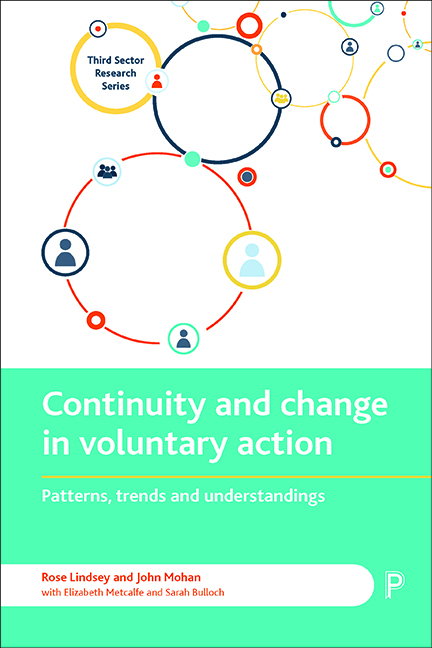Book contents
- Frontmatter
- Contents
- List of figures and tables
- Foreword
- Acknowledgements
- Notes on authors
- Acronyms
- one Introduction
- two The changing policy environment for voluntary action from 1979
- three Data: sources and definitions
- four Trends in volunteering and trends in the voluntary sector
- five Content and context of volunteering
- six Why people volunteer: contextualising motivation
- seven Volunteering trajectories: individual patterns of volunteering over the lifecourse
- eight Attitudes to voluntary action
- nine Conclusions
- Appendix: Anonymised details of writers
- References
- Index
two - The changing policy environment for voluntary action from 1979
Published online by Cambridge University Press: 13 April 2022
- Frontmatter
- Contents
- List of figures and tables
- Foreword
- Acknowledgements
- Notes on authors
- Acronyms
- one Introduction
- two The changing policy environment for voluntary action from 1979
- three Data: sources and definitions
- four Trends in volunteering and trends in the voluntary sector
- five Content and context of volunteering
- six Why people volunteer: contextualising motivation
- seven Volunteering trajectories: individual patterns of volunteering over the lifecourse
- eight Attitudes to voluntary action
- nine Conclusions
- Appendix: Anonymised details of writers
- References
- Index
Summary
Introduction
Mass Observation (MO) was originally set up in 1937, becoming established during the Second World War, a period which witnessed a substantial extension of state intervention in the provision of welfare services. MO's work contributed greatly to the understanding of public attitudes during the period of wartime planning for the welfare state. For several subsequent decades a broadly-shared consensus on welfare held sway, associated with the primacy of public financing and provision of key elements of the welfare state, with voluntary initiatives by citizens playing a relatively residual part in the welfare mix. Of course, voluntarism never went away in the post-war period; voluntary effort and voluntary organisations continued to have articulate supporters, who made the case for more pluralist arrangements for the delivery of welfare services. Prior to 1979, however, few people outside rightwing thinktanks would have proposed that Beveridge's ‘perpetually moving frontier’ between statutory and voluntary sectors would shift substantially back in the direction of the latter. Arguably, nearly four decades after the Conservatives were returned to power in 1979, the shift has been as much one of rhetoric and style as of substance.
The advent of Margaret Thatcher's Conservative administration, committed to rolling back the state, raised the possibility that government policy might open up much more scope for greater reliance on voluntary organisations and voluntary action. In this chapter we therefore consider subsequent key changes in the policy landscape. Discussion of the development of social policy under the governments of Margaret Thatcher and John Major also provides opportunities to identify parallels with the post-2010 administrations led by David Cameron and Theresa May as well as continuities and discontinuities between those governments and those led by Tony Blair and Gordon Brown. All post-1979 Prime Ministers proclaimed their support, at various times and in different ways, either for voluntary action per se, for initiatives designed to enhance the scope for voluntary action, and for non-state provision of public services, although the means through which they pursued those objectives varied.
In the introductory chapter, referencing Kendall (2003; 2009), we noted that policy in relation to voluntarism in recent decades has tended towards measures targeted at voluntary action by individuals, initiatives to encourage the development of voluntary organisations, and the institutionalisation of mechanisms for bringing the voluntary sector into public policy deliberation.
- Type
- Chapter
- Information
- Continuity and Change in Voluntary ActionPatterns, Trends and Understandings, pp. 19 - 38Publisher: Bristol University PressPrint publication year: 2018



